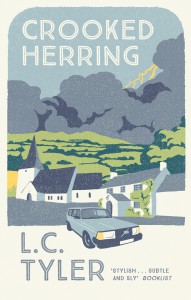L C Tyler is my guest
 Of the sub-genres of crime fiction, I think comedy is the hardest to pull off, but Len Tyler succeeds triumphantly. The Ethelred and Elsie series is one of the very best. It began with The Herring Seller’s Apprentice and the fifth has just come out. I began by asking Len to tell us something about it.
Of the sub-genres of crime fiction, I think comedy is the hardest to pull off, but Len Tyler succeeds triumphantly. The Ethelred and Elsie series is one of the very best. It began with The Herring Seller’s Apprentice and the fifth has just come out. I began by asking Len to tell us something about it.
Crooked Herring is case number five for the literary detective duo Ethelred and Elsie. Henry, a friend of crime writer Ethelred Tressider, arrives out of the blue to announce that he thinks he may have killed somebody – he’s just not sure who or when. Ethelred feels that ultraconservative Henry is an unlikely murderer. But worryingly Henry’s companion on a drunken New Year pub crawl, thriller writer Crispin Vynall, has vanished without trace. Ethelred knows Crispin and, more to the point, knows Crispin’s wife, who is surprisingly unconcerned that her husband is missing. Will Ethelred solve the problem of the missing thriller writer? Or will his past catch up with him first? Because there are clearly things that Ethelred has not revealed to anyone else (especially to his agent Elsie) about his relationship with Emma Vynall. As Elsie later helpfully points out to the police: ‘He fancied her rotten. Would you like another biscuit with that coffee, Inspector?’?
How do you carve out time to write? What’s your writing routine?
It depends how close I am to a deadline! I may be slaving away early morning to late at night, glued to my desk with just a break for a quick beans on toast. Or I may spend time on all sorts of other things like interviews, with coffee every half an hour. My next deadline is January. Do you fancy a cup? I’m just putting the kettle on.
Love one, thanks, and while it’s brewing, What comes first for you: theme, plot, characters, setting?
For the series I do of course have the main characters already, so they are certainly the starting point – a plus in some ways and a major constraint in others. Then it’s usually an idea – in this case, what if you woke up one morning with a vague idea that the night before you had done something dreadful – you just can’t remember what? Not uncommon after a Crime Writers’ Association summer party, you might say, but Henry ‘s car is covered in mud and he has scratches all over him. Then there’s the length of rope in the boot. At that stage in the writing process I may have only the haziest idea what Henry’s done and how Ethelred will fit into the plot, but I’ll find out shortly. Even if I don’t know, the characters usually do. The first draft tends to be all about getting the plot into place. Descriptions of settings and of minor characters usually come later. So do a lot of the jokes.
Who are your writing heroes? Whose books do you like to read, and why?
I think I was a writer of humour first and a crime writer second, though now obviously crime is what I do. My early influences were PG Wodehouse, Evelyn Waugh, Alan Coren and Stephen Leacock. Later Christie, Sayers and Ellis Peters. I don’t write Golden Age pastiche exactly, but the influence is there. Lots of amateur detection and red herrings but not too much blood. And all of the sex is off the page. Recently I’ve read CJ Sansom’s Dominion, Ruth Downie’s Tabula Rasa, Eliza Graham’s The One I Was and Antonia Hodgson’s The Devil in the Marshalsea – all highly recommended by the way. I read for all sorts of reasons. I’ve always read primarily for enjoyment, and that’s still the main incentive to pick up a book. Having started another series, set in the seventeenth century, I now also read a lot for research. And I read some books out of duty in the sense that you have to keep up with what others are writing in the genre and indeed learn from them. Not that these last two categories can’t be fun as well. I might even work out how to write sex scenes.
A favourite bookshop?
Goldsboro Books in Charing Cross – packed with signed first editions, new and old.
What are you writing now?
Unusually for me, I’m working on two books in parallel – the second in the (John Grey) historical series and the sixth E&E. I’m also writing a chapter for the next Detection Club collaborative novel.
And finally: is Elsie’s client list full? Would she consider being my agent?
If you are happy to put up with a great deal of editorial sarcasm and to keep her supplied with chocolate, then I’m sure she’d take you on.
To find out more about Len and his novels go to http://www.lctyler.com
2 Comments
Ann Weisgarber
October 2, 2014Great interview with Len Tyler who is as funny in person as he is on the page. I recently had a chance to see him at the Historical Novel Society Conference in London where one of his short stories was a finalist in a competition. Anyone who can write award-winning humorous crime novels and short stories is packed with talent. Can’t wait for the next books!
Christine Poulson
October 5, 2014Glad you enjoyed the interview. Yes, Len is great company and has a dry sense of humour.